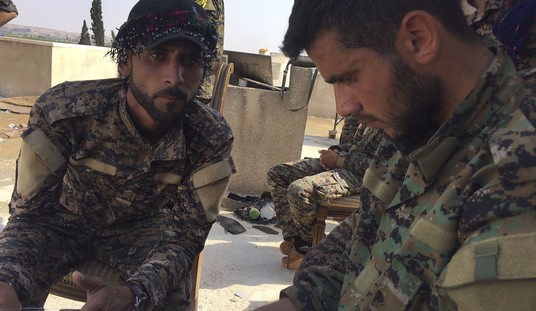
Turkey’s President Recep Tayyip Erdogan speaks during the opening of the new terminal of Aden Abdulle International Airport in Mogadishu, Somalia on January 25. 2015 AMISOM Photo / Ilyas Ahmed
Yesterday, I shared the revelation that Sen. Lindsey Graham had been prank called by the same Russians that got Rep. Adam Schiff by promising naked pictures of Donald Trump. In this most recent call, Graham is heard agreeing to many details about the Turkish-Kurdish conflict that he hasn’t been saying publicly. Namely, that it’s a volatile, complicated situation, with the United States stuck in the middle of two factional allies, neither of which is the clear good and both of which present strategic issues.
Among many things, a misunderstanding and over simplifying (and conservative media in general have been some of the worst) of who the YPG are, why Turkey wants them off the border, and how we have no good options has driven a level of hysteria that’s helping no one.
Here’s some of what I wrote.
In Graham’s prank phone call, we actually see him admit the issues at hand. The YPG are a real problem and Turkey does have legitimate reasons to push back on them. The group’s goal is to form a Marxist state made up of Turkish and Syrian land. As you can imagine, that raises the temperature in the area among all involved. Further, it must be said that the Kurds in Iraq are not the same as those in Northern Syria. The former are our traditional allies, the latter are not. Iraqi Kurds see the YPG as extremists (and, objectively, they are).
The United States, due to the failures of the past administration, has been put in an impossible situation. Graham appears to know this but hasn’t had the guts to say it publicly. He simply got caught with this prank call.
With Turkey saying they were coming across the border, there were no good options here. The fact that we are dealing with the YPG makes the matter extremely difficult navigate. We were placed in the middle of two historically warring groups. One is a NATO ally and is vitally strategic for our national security. The other did help us defeat ISIS in Northern Syria. This all paints a dangerous shade of gray and the President made the decision to not continue to play chicken with Turkey. Even if you think it’s the wrong move, the certainty with which some have been shouting crosses into the ridiculous.
Of course, there’s nothing I can write that Andrew McCarthy can’t come along and do better and he penned an excellent explainer at National Review yesterday. This actually came as a dissent to the stated opinion of the editorial board at the conservative magazine. I won’t give everything away here, because you should go read every word of it yourself, but I’ll hit some highlights.
I thus respectfully dissent from our National Review editorial.
President Trump, it says, is “making a serious mistake” by moving our forces away from what is described as “Kurdish territory”; the resulting invasion by superior Turkish forces will “kill American allies” while “carving out a zone of dominance” that will serve further to “inflame and complicate” the region.
Where to begin? Perhaps with the basic fact that there is no Kurdish territory. There is Syrian territory on Turkey’s border that the Kurds are occupying — a situation that itself serves to “inflame and complicate” the region for reasons I shall come to. Ethnic Kurds do not have a state. They live in contiguous parts of Syria, Turkey, Iraq, and Iran. Most are integrated into these countries, but many are separatists.
The Kurds have been our allies against ISIS, but it is not for us that they have fought. They fight ISIS for themselves, with our help. They are seeking an autonomous zone and, ultimately, statehood. The editorial fails to note that the Kurds we have backed, led by the YPG (People’s Protection Units), are the Syrian branch of the PKK (the Kurdistan Worker’s Party) in Turkey. The PKK is a militant separatist organization with Marxist-Leninist roots. Although such informed observers as Michael Rubin contend that the PKK has “evolved,” it remains a formally designated foreign terrorist organization under U.S. law. While our government materially supports the PKK’s confederates, ordinary Americans have been prosecuted for materially supporting the PKK.
This is a major issue, not because the Kurds simply exist, but because the YPG in Northern Syria operate as a terrorist organization in the pursuit of a Marxist state (yes, that may sound out of place, but they are indeed Marxists). While they did help fight ISIS in their own backyard, the United States can not provide them autonomy in a foreign country. That has left us in a gray zone with no clear end game. Leaving 50 U.S. advisors stranded in Northern Syria as human shields in the hopes they scare off Turkey’s incursion is not a plan. It’s an emotional plea.
Those of us opposed to intervention in Syria wanted Congress to think through these quite predictable outcomes before authorizing any further U.S. military involvement in this wretched region. Congress, however, much prefers to lay low in the tall grass, wait for presidents to act, and then complain when things go awry.
And so they have: The easily foreseeable conflict between Turkey and the Kurds is at hand. We are supposed to see the problem as Trump’s abandoning of U.S. commitments. But why did we make commitments to the Kurds that undermined preexisting commitments to Turkey? The debate is strictly framed as “How can we leave the Kurds to the tender mercies of the Turks?” No one is supposed to ask “What did we expect would happen when we backed a militant organization that is tightly linked to U.S.-designated terrorists and that is the bitter enemy of a NATO ally we knew would not abide its presence on the ally’s border?” No one is supposed to ask “What is the end game here? Are we endorsing the partition of Syria? Did we see a Kurdish autonomous zone as the next Kosovo?” (We might remember that recognition of Kosovo’s split from Serbia, over Russian objections, was exploited by the Kremlin as a rationale for promoting separatism and annexations in Georgia and Ukraine.)
And those questions are what much of the conservative media refuse to answer. Instead, they pretend it’s as simple as “protecting the Kurds” and “not abandoning our allies.” Which ally? Which Kurds? What do we do about a decades long battle between Turkey and PKK allied separatist groups? Do we send even more troops to set up a real safe zone? By what Congressional authority can that even be done? No one wants to talk about this stuff because it’s easier to virtue signal on Twitter.
I’ll let you go read McCarthy’s article to get the rest, as what I’ve posted here is just a small sampling. He meticulously goes through all angles related to what we are dealing with. The only certainty of this situation is that there are no easy answers. We simply can’t remain in Northern Syria into perpetuity protecting a designated terrorist group at odds with a NATO ally. If Congress feels either of those designations is wrong, they are welcome to get off their soap boxes and start doing some actual work.
Here’s my suggestion. If Congress truly feels strongly about this, nothing is stopping them from passing an AUMF that actually makes future actions legal. That would at least send a strong signal that they are serious. Yelling on Twitter is not accomplishing anything.
Enjoying the read? Please visit my archive and check out some of my latest articles.
I’ve got a new twitter! Please help by following @bonchieredstate.















Join the conversation as a VIP Member